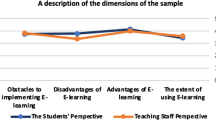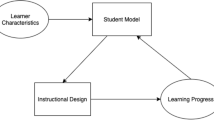Abstract
E-learning is the synthesis of multimedia and social media platforms powered by Internet and mobile technologies. Great popularity of e-learning is encouraging governments and educational institutions to adopt and develop e-learning cultures in societies in general and universities in particular. In traditional e-learning systems, all components (agents and services) are tightly coupled into a single system. In this study, we propose a new architecture for e-learning with two subsystems, namely, e-learning and e-testing. The motivation of the research is to improve the effectiveness of the learning process by extracting relevant features for elastic learning and testing process. We employ a multi-agent system because it contains five-layer architecture, including agents at various levels. We also propose a novel method for updating content through question and answer between e-learners and intelligent agents. To achieve optimization, we design a system that applies various technologies, which guarantee various dynamic features for e-learning systems, such as intelligence, distributed nature, adaptive attitude, interaction, accessibility, and security. Agent assisted e- learning enable the users to collect the quantifiable and sensible material; examine, and distribute customized knowledge from multiple e-learning sources. Intelligent agents, being program helper or assistants, are deployed at different levels of abstraction in this architecture to manage information overload and create environment for learners. Moreover, this proposed system is designed by keeping in view several characteristics specific to e-learning system such as interaction, personalization, adaptation, intelligence, interoperability, accessibility and security. The architecture is designed to support instructional design, to retrieve relevant learning materials, to process and analyses data to enable meaningful e-learning recommendations for instructors and learners by considering all issues that existing e-learning architectures don’t address. Most of the existing e-learning architectures don’t consider all the features in a single system so there is a need for a generic architecture that should support all the features to make the e-learning system more efficient. The outcome of this approach is to provide flexible and lightweight systems for e-learning environments.










Similar content being viewed by others
Change history
09 November 2019
The Editor-in-Chief has retracted this article.
References
Ali, A., Dehghan, H., Gholampour, J.: An agent based multilayered architecture for e-learning system. In: IEEE Second International Conference on E-learning and E-teaching (ICELET), pp. 22–26
Al-Sakran, H.: An agent-based architecture for developing e-learning system. Inf. Technol. J. 5(1), 121–127 (2006)
AlZahrani, S., Ayesh, A., Zedan, H.: Multi-agent system based regional data grid. In: IEEE International Conference on Computer Engineering and Systems, ICCES, pp. 337–342
Andreev, R., Troyanova, N.: E-learning design: an integrated agent-grid service architecture. In: IEEE John Vincent Atanasoff 2006 International Symposium on Modern Computing, JVA’06, pp. 208–213
Babu, S.R., Kulkarni, K.G., Sekaran, K.C.: A generic agent based cloud computing architecture for e-learning. In: ICT and Critical Infrastructure: Proceedings of the 48th Annual Convention of Computer Society of India, Vol I, pp. 523–533. Springer, Newyork (2014)
Baker, R., Siemens, G.: Educational data mining and learning analytics. Cambridge Handbook of the Learning Sciences, 2nd edn. Cambridge University Press, Cambridge (2014)
Bhaskaran, S., Swaminathan, P.: Intelligent adaptive e-learning model for learning management system. Int. J. Technol. Policy Manag. 14, 99–109 (2014)
Bittencourt, I.I., Costa, E., Silva, M., Soares, E.: A computational model for developing semantic web-based educational systems. Knowl. Based Syst. 22(4), 302–315 (2009)
Bouslimi, I., Hanachi, C., Tout, H., Ghedira, K.: A coordination framework for cooperative information gathering. Int. J. Adv. Intel. Paradig. 1(1), 60–79 (2008)
Chellatamilan, T., Suresh, R.: Service oriented intelligent agents for e-learning aystems. Int. J. Comput. Sci. Commun. Technol. 2, 6360–6369 (2009)
Chen, G.: The research on architecture of intelligent E-learning system. In: IEEE 4th International Conference on Computer Science and Education, pp. 1079–1081
Chen, X.: Agent-based micro-simulation of staged evacuations. Int. J. Adv. Intel. Paradig. 4(1), 22–35 (2012)
Conrad, S., Clarke-Midura, J., Klopfer, E.: A framework for structuring learning assessment in a massively multiplayer online educational game: experiment centered design. Int. J. Game Based Learn. 4(1), 37–59 (2014)
Cristea, P.D., Tuduce, R.: Intelligent e-learning environments architecture and basic tools. In: Proceedings of the FIfth International Conference on Information Technology Based Higher Education and Training, ITHET, IEEE, pp. 610–615
Dagger, D., O’Connor, A., Lawless, S., Walsh, E., Wade, V.P.: Service-oriented e-learning platforms: from monolithic systems to flexible services. Internet Comput. IEEE 11(3), 28–35 (2007)
De Arriaga, F., El Alami, M., Arriaga, A.: Multi-agent architecture for intelligent e-learning. In: Proceedings of the 2003 10th IEEE International Conference on Electronics, Circuits and Systems, ICECS, pp. 1228–1231
De Meo, P., Garro, A., Terracina, G., Ursino, D.: Personalizing learning programs with X-learn, an XML-based, “user-device” adaptive multi-agent system. Inf. Sci. 177(8), 1729–1770 (2007)
Dias, S.B., Diniz, J.A., Hadjileontiadis, L.J.: E-learning exequibility in the information and knowledge society. In: Towards an Intelligent Learning Management System Under Blended Learning, pp. 3–19. Springer, New York (2014)
Fang, P., Yu, P.: Collaborative learning grouping problem in multi-agent e-learning based on rough set. In: 2008 International Conference on Computer Science and Software Engineering, pp. 174–177
Gascueña, J.M., Fernandez-Caballero, A., Gonzalez, P.: Domain ontology for personalized e-learning in educational systems. In: ICALT, pp. 456–458
Gong, T., Ding, Y., Xiong, Q.: Web-based e-learning and virtual lab of human–artificial immune system. Pak. J. Pharm. Sci. 27(3 Suppl), 729–734 (2014)
Gonzalez, R.A.: Architecture of a discrete-event and agent-based crisis response simulation model. Int. J. Adv. Intel. Paradig. 4(1), 36–53 (2012)
Holanda, O., Ferreira, R., Costa, E., Bittencourt, I.I., Melo, J., Peixoto, M., Tiengo, W.: Educational resources recommendation system based on agents and semantic web for helping students in a virtual learning environment. Int. J. Web Based Communities 8(3), 333–353 (2012)
Hussain, N., Khan, M.: Service-oriented e-learning architecture using web service-based intelligent agents. In: IEE First International Conference on Information and Communication Technologies, pp. 137–143
Jurado, F., Redondo, M.A., Ortega, M.: Blackboard architecture to integrate components and agents in heterogeneous distributed e-learning systems: An application for learning to program. J. Syst. Softw. 85(7), 1621–1636 (2012)
Kawamura, T., Sugahara, K., Kinoshita, S., Nakatani, R., Motomura, S.: Backup and recovery scheme for multi-agent-based e-learning system. In: IEEE International Conference on Integration of Knowledge Intensive Multi-agent Systems, KIMAS, pp. 73–78
Kim, J., Hwang, D., Park, S.I., Lee, H., Hong, C., Kim, W.: Personalized interactive e-learning system using expanded SCORM. Appl. Math. 8(1L), 133–139 (2014)
Li, X.: A study on e-learning systems integration based on multi-agent technology. In: IEEE 2nd International Conference on Education Technology and Computer (ICETC), pp. V1-294–V291-297
Li, C.Z.Z.X.W., Zhen, S.: Design and implementation on e-learning environment based on agent. Int. J. Comput. Sci. Inf. Secur. 7, 23–29 (2010)
Liu, Z., Jin, H., Fang, Z.: Collaborative learning in e-learning based on multi-agent systems. In: IEEE 10th International Conference on Computer Supported Cooperative Work in Design, CSCWD’06, pp. 1–5
Lu, H.K.: Learning styles and acceptance of e-learning management systems: an extension of behaviour intention model. Int. J. Mob. Learn. Organ. 6(3), 246–259 (2012)
Mahdi, H., Attia, S.S.: MASCE: a multi-agent system for collaborative e-learning. In: IEEE/ACS International Conference on Computer Systems and Applications, AICCSA, pp. 925–926
Marciniak, J.: Building intelligent tutoring systems immersed in repositories of e-learning content. Proc. Comput. Sci. 35, 541–550 (2014)
McGill, T., Klobas, J., Renzi, S.: continuation of e-learning initiatives. Internet Higher Educ. 22, 24–36 (2014)
Mustakerov, I., Borissova, D.: A conceptual approach for development of educational web-based e-testing system. Expert Syst. Appl. 38(11), 14060–14064 (2011)
Neji, M., Ben Ammar, M.: Agent-based collaborative affective e-learning framework. Electron. J. e-Learn. 5(2), 123–134 (2007)
Neves, ARdM, Carvalho, Á.M.G., Ralha, C.G.: Agent-based architecture for context-aware and personalized event recommendation. Expert Syst. Appl. 41(2), 563–573 (2014)
Orzechowski, T.: The use of multi-agents’ systems in e-learning platforms. In: IEEE Siberian Conference on Control and Communications, SIBCON’07, pp. 64–71
Peng, Y.: Intelligent content push for SCORM-based e-learning systems. In: IEEE International Symposium on Intelligent Information Technology Application Workshops, IITAW’08, pp. 239–242
Ponnusamy, R., Gopal, T.: A user-adaptive self-proclamative multi-agent based recommendation system design for e-learning digital libraries. In: 2006 IEEE Conference on Cybernetics and Intelligent Systems, pp. 1–7
Richardson, A.M.: Success factors in introducing distance, flexible and e-learning in technical and vocational skills development. Technology 2013(2012), 2011 (2014)
Rius, À., Conesa, J., García-Barriocanal, E., Sicilia, M.-A.: Automating educational processes implementation by means of an ontological framework. Comput. Stand. Interfaces 36(2), 335–348 (2014)
Sakthiyavathi, K., Palanivel, K.: A generic architecture for agent based e-learning system. In: IEE International Conference on Intelligent Agent and Multi-agent Systems, IAMA, pp. 1–5
Salmeron-Majadas, S., Santos, O.C., Boticario, J.G.: Inclusive personalized e-learning based on affective adaptive support. In: User Modeling, Adaptation, and Personalization, pp 384–387. Springer, New York (2013)
Sanchez, R.P., Bartel, C.M., Brown, E., DeRosier, M.: The acceptability and efficacy of an intelligent social tutoring system. Comput. Educ. 78, 321–332 (2014)
Secundo, G., Grippa, F.: Designing, managing and assessing a Web 2.0 learning community to enhance inquiry based learning. Int. J. Web Based Communities 6(2), 164–182 (2010)
Seng, J.-L., Lin, S.: A mobility and knowledge-centric e-learning application design method. Int. J. Innov. Learn. 1(3), 293–311 (2004)
Sharma, R., Banati, H., Bedi, P.: Social support based multi-agent framework for designing an e-learning course. In: 2011 IEEE 3rd International Conference on Communication Software and Networks (ICCSN), pp. 160–164
Shen, Z., Gay, R., Miao, C.Y., Wang, Q.: Goal oriented modeling for agent mediated e-learning grid. In: IEEE 8th Control, Automation, Robotics and Vision Conference, ICARCV 2004, pp. 2280–2285
Stoyanov, S., Ganchev, I., Popchev, I., O’Droma, M.: An approach for the development of a context-aware and adaptive e-learning middleware. In: Intelligent Systems: From Theory to Practice. Springer, New York, pp 519–535 (2010)
Thukral, A., Datta, S.M., Banati, H., Bedi, P.: Informal e-learning using multi agent systems. In: ISDA, pp. 213–217
Uday Kumar, M., Mamatha, J., Jain, S., Jain, D.: Intelligent online assessment methodology. In: IEEE 7th International Conference on Next Generation Web Services Practices (NWeSP), pp. 215–220
Van Rosmalen, P., Brouns, F., Tattersall, C., Vogten, H., Bruggen, J., Sloep, P., Koper, R.: Towards an open framework for adaptive, agent-supported e-learning. Int. J. Contin. Eng. Educ. Life Long Learn. 15(3), 261–275 (2005)
Wei, X., Yan, J.: An e-learning system architecture based on web services and intelligent agents. In: IEE Ninth International Conference on Hybrid Intelligent Systems, HIS’09, pp. 173–177
Xu, D., Huang, W.W., Wang, H., Heales, J.: Enhancing e-learning effectiveness using an intelligent agent-supported personalized virtual learning environment: an empirical investigation. Inf. Manag. 51(4), 430–440 (2014)
Author information
Authors and Affiliations
Corresponding author
Additional information
The Editor-in-Chief has retracted this article [1] because validity of the content of this article cannot be verified. This article showed evidence of peer review and authorship manipulation.
Authors Muhammad Arif, Ahmad Karim, Shahaboddin Shamshirband, Khubaib Amjad Alam, Shahid Farid, Salman Iqbal do not agree to this retraction. Authors Manzoor Illahi, Zolkepli Buang, Valentina Emilia Balas have not responded to any correspondence from the editor or publisher about this retraction.
References:
1. “An architecture of agent-based multi-layer interactive e-learning and e-testing platform” Muhammad Arif*, Manzoor Illahi, Ahmad Karim, Shahaboddin Shamshirband, Khubaib Amjad Alam, Shahid Farid, Salman Iqbal, Zolkepli Buang, Valentina Emilia Balas Published 31 october 2014 https://link.springer.com/article/10.1007/s11135-014-0121-9
About this article
Cite this article
Arif, M., Illahi, M., Karim, A. et al. RETRACTED ARTICLE: An architecture of agent-based multi-layer interactive e-learning and e-testing platform. Qual Quant 49, 2435–2458 (2015). https://doi.org/10.1007/s11135-014-0121-9
Published:
Issue Date:
DOI: https://doi.org/10.1007/s11135-014-0121-9




